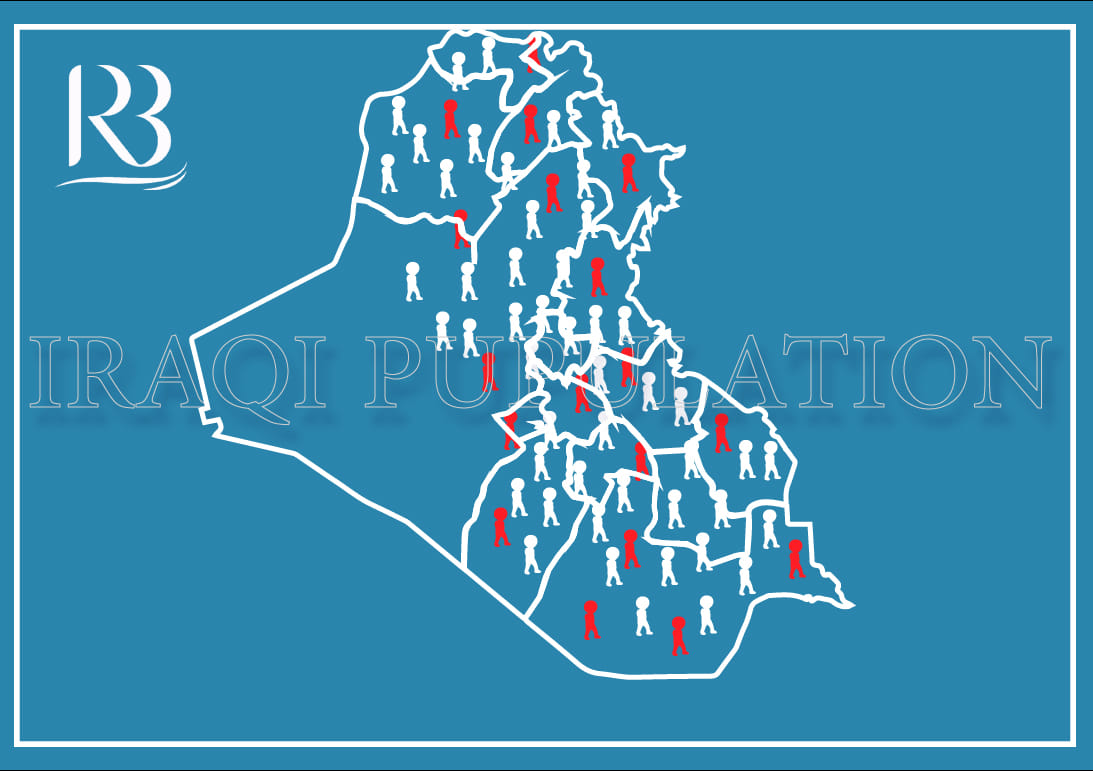Iraq and the housing crisis
millimeter. Seema Ali Mahdi
The population explosion threatens Iraq with a future crisis, and calls and warnings emerge from time to time to remedy the fate of future generations in light of the high level of population growth and the entrenchment of the rentier economy in the country by adopting oil as the main resource, which constitutes more than 85% of the total national income. And the Iraqi Ministry of Planning announced that the population of Iraq will reach by the end of the year (2021) 41 million and 190 thousand and 658 people distributed by 50.50% for men and 49.5% for women.
This huge population is offset by the suffering of millions of Iraqis who lack the homes they own, forcing many of them to rent houses at high prices in the city, or to resort to random housing in popular areas on the outskirts of cities or in their dilapidated old neighborhoods.
With the absence of government plans to confront this crisis, and many buildings that were built improvised in Baghdad, without taking into account the necessary infrastructure, and ignoring the instructions of the municipality and urban planning.
Since the housing crisis refers to an acute shortage in the number of housing units required in a specific place and time, it is noted that there is a huge difference between what is offered of housing units and what is required of them. Therefore, the main reason behind the housing crisis in Iraq:
1- Socio-demographic reasons: Population increase has become a phenomenon that threatens individuals with the assassination of their childhood. There is nothing more severe than depriving a person of education and going out to work at an early age because his family, which gave birth to 7 or 8 others, could not spend on them and meet their needs, and threatens countries and environments to devour development and influence on resources, and then weak production rates because they are not proportional to the huge consumption rates (). The Iraqis need more birth control and attention to reproductive health because of the circumstances surrounding them that lead them to want more than they do to development and progress? We found that this has been the focus of the Ministry of Planning's attention since 2012, when the report "Analysis of the Population Situation in Iraq" stated that young women are less inclined to use family planning methods than older women. Despite the emergence of remarkable support for the adoption of the "birth control" law, according to opinion polls conducted by civil institutions in Iraq, this matter is not possible because of "the presence of religious and tribal ideas that contradict it." Although regulating childbearing out of concern for education is permissible in it, given that the Messenger, may God bless him and grant him peace, permitted isolation, it is indignant to see the poor and low-income have children in abundance that comes from ignorance in the first place and the desire not to bear the responsibility of these children and place their responsibility on society and the state. . This is with the exception of the psychological aspect that children are exposed to as a result of their deprivation of their rights to a decent life and to complete their education. Likewise, changes in migration from the countryside to the city, and internal displacement as a result of the security crisis, put pressure on urban areas, especially the capital, Baghdad .
2- Economic reasons: the majority of Iraqi families suffer from the high real estate price index in the areas of the capital, Baghdad, which contributed to the difficulty of some of them obtaining shelter, which caused the rental prices to rise, reaching the lowest (500 thousand Iraqi dinars), and the proliferation of random housing areas and abuses and Agricultural lands and in light of the unemployment crisis ().
3- Weakness of organized planning for housing rights: There is no doubt that planning and good management is the salient feature of the most developed countries, and due to the unstable conditions in the country, planning and management have suffered from many problems, including:
A - The weakness of the planning agencies in terms of efficiency and the lack of benefit from foreign expertise in this field.
B- Individual and random decision-making in the field of housing, including, for example, the completion of low-cost housing projects, the random distribution of land, and the lack of services for it.
C - Not giving way early to invest in the field of housing.
D - the lack of a clear strategic vision for the residential function and its future directions.
C - The absence of basic plans for many Iraqi cities, and if any exist, they are old, not updated, and do not keep pace with global developments and actual needs. This is in addition to the psychological problems caused by the overpopulation crisis, including (the collision between families). The new generation, the educated son tries to discuss with his father the issues of his life, and then the culture that the son carries is somewhat different from the culture of the father. So the son tries to manage the responsibility of his family on his own basis, which causes family tensions, as the father attempts to control and implement what he believes in. Except for the large number of married couples in the same house, which causes many problems due to the different orientations and visions, not to mention the different psychology among them, and thus the family intimacy was shaken, which requires leaving it for psychological safety .
That is why Iraq is considered a fragile state, and the fragility index, according to the Peace Fund Index for achieving sustainable security and development, includes :
1- Social indicators, including:
A- The demographic pressures that the state is exposed to from the population itself (high population growth or skewed population distributions - provision of food and health services, etc.), or the surrounding environment such as natural disasters (hurricanes, earthquakes, floods or drought) that make it difficult for the government to protect its citizens, so it appears on them. Lack of ability or desire to perform its functions.
b- Refugees and internally displaced persons, which harms public services and potentially constitutes a security threat.
C - Collective grievances When tension and violence exist between groups, the state's ability to provide security weakens, and more violence may result.
D - brain drain, and often leave those who possess the material and scientific ingredients, which is reflected negatively on the composition of society. 2- Economic indicators, including uneven economic development that affects segments of the people. The Iraq index in terms of fragility for the year 2019 globally ranks (13), while in the Arab world it ranks (5), with an index of 99.1 with a maximum score (99.1). As for the year 2020, its percentage is (95.9).
Housing crisis solutions
1- The need for the Ministry of Housing and Construction to pay attention to reviewing national housing policies and adopting a clear strategy in order to achieve adequate housing for all segments of society. And relying on vertical construction to mitigate the high population density and the serious social problems it causes. As well as taking advantage of the large area of unused lands that can alleviate the housing crisis.
2- The Council of Representatives and the Council of Ministers should define the policy of (house rent) and issue laws that end the exploitation of landlords and real estate owners, and this helps eliminate the phenomenon of overcrowding within the housing unit.
3- Facilitating a housing loan sufficient to cover construction expenses, provided that the building is modern.
4- Replacing the distribution of lands by building housing units that help get rid of the housing crisis at reasonable rental prices, and if the state wants to give free housing to help some citizens who do not have housing by giving them an apartment instead of a piece of land, because Iraq is in a continuous population increase and fair distribution guarantees community safety and security together and with this It does not threaten the stability of the state and allow the exploiters of the crisis to ignite it.







